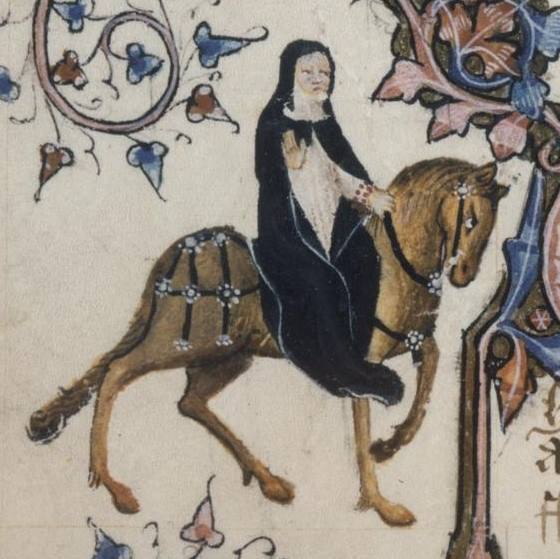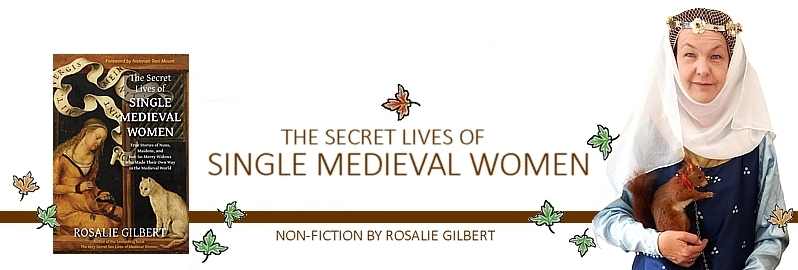Rosalie's Medieval Woman (![[personal profile]](https://www.dreamwidth.org/img/silk/identity/user.png) sister_raphael) wrote2025-06-03 06:58 am
sister_raphael) wrote2025-06-03 06:58 am
Single Medieval Widows Travelled
Single medieval women in the form of new widows were often in a position to travel. In fact, one particular widow was told by her husband on his deathbed that as soon as he dies, she was to make all haste and not wait, and visit five shrines in holy places for the good of his soul. He not only named the places she was to go, but pre-paid her expenses for all the trips.
Our widow was instructed to not wait at home and observe the usual grieving practices, she was to leave right away! He felt that he hadn't made amends for his sins at these places personally, and so it was very urgent that his widow was to go post haste.
What could she do but pack her bags and comply? ... and here she was, a newly single woman out seeing the world and not a person could censure her for it. It was her husband's wish. She absolutely could not refuse.

Medieval ampulla like this one from my collection, which you can see here in The Gilbert Collection, were favourite pilgrimage souvenirs. They contained water blessed from shrines and it was hoped that the water would have protective qualities and cure sickness for those at home who could not travel to the shrines themselves.
In the case that a widow loved her husband dearly, forced travel at the time when she would have preferred to be at home surrounded by her loved ones and family, would perhaps have been just awful. In the case that it was an arranged marriage or the husband had not been a kind man, perhaps a trip away might have saved her the effort of pretending to grieve.
False grieving was commented on by clergymen who wrote that some widows force pretend tears at the funeral whilst at the same time looking for a new husband before the old is in the ground or, and this is a double edged sword here, wailing extensively because the husband has died and the widow and children have no source of income and no means to live without him.
Honestly, this is a legitimate concern, but was interpreted by some as being selfish. Thoughts should be firmly directed on the deceased, not on herself, was the feeling.
 Without a doubt, one of the most famous of single medieval women who travelled is our literary Prioress, a creation of 14th century writer, Chaucer. An illumination of her can be seen here.
Without a doubt, one of the most famous of single medieval women who travelled is our literary Prioress, a creation of 14th century writer, Chaucer. An illumination of her can be seen here.
Her character inspired by a actual historical person, and the description of her lavish personal accoutrements and love of the finer things in life, and we find her in visiting dioces records where the nuns are furiously complaining about Eglentyne.
Whilst Chaucer's Madame Eglantine was a composite figure of some of the best and worst things associated with nuns at this time, our Eglentyne, the third daughter of a well-to-do person, became a nun at the tender age of fifteen and lived a reasonably civil life for ten years or so before being promoted to Prioress.
And this is where she got unruly.
The nuns under her were very unhappy. She was selling wood to outsiders, selling off the best silver spoons, dressing like a secular women, wearing far too much jewellery and taking so many trips outside their cloistered walls, that it was sending the establishment broke.
For more information about single medieval women who travelled, there's a chapter in my book, the Secret Lives of Single Medieval Women, out in most countries now or available directly from Mango Publishing in the USA.

Our widow was instructed to not wait at home and observe the usual grieving practices, she was to leave right away! He felt that he hadn't made amends for his sins at these places personally, and so it was very urgent that his widow was to go post haste.
What could she do but pack her bags and comply? ... and here she was, a newly single woman out seeing the world and not a person could censure her for it. It was her husband's wish. She absolutely could not refuse.

Medieval ampulla like this one from my collection, which you can see here in The Gilbert Collection, were favourite pilgrimage souvenirs. They contained water blessed from shrines and it was hoped that the water would have protective qualities and cure sickness for those at home who could not travel to the shrines themselves.
In the case that a widow loved her husband dearly, forced travel at the time when she would have preferred to be at home surrounded by her loved ones and family, would perhaps have been just awful. In the case that it was an arranged marriage or the husband had not been a kind man, perhaps a trip away might have saved her the effort of pretending to grieve.
False grieving was commented on by clergymen who wrote that some widows force pretend tears at the funeral whilst at the same time looking for a new husband before the old is in the ground or, and this is a double edged sword here, wailing extensively because the husband has died and the widow and children have no source of income and no means to live without him.
Honestly, this is a legitimate concern, but was interpreted by some as being selfish. Thoughts should be firmly directed on the deceased, not on herself, was the feeling.
 Without a doubt, one of the most famous of single medieval women who travelled is our literary Prioress, a creation of 14th century writer, Chaucer. An illumination of her can be seen here.
Without a doubt, one of the most famous of single medieval women who travelled is our literary Prioress, a creation of 14th century writer, Chaucer. An illumination of her can be seen here.Her character inspired by a actual historical person, and the description of her lavish personal accoutrements and love of the finer things in life, and we find her in visiting dioces records where the nuns are furiously complaining about Eglentyne.
Whilst Chaucer's Madame Eglantine was a composite figure of some of the best and worst things associated with nuns at this time, our Eglentyne, the third daughter of a well-to-do person, became a nun at the tender age of fifteen and lived a reasonably civil life for ten years or so before being promoted to Prioress.
And this is where she got unruly.
The nuns under her were very unhappy. She was selling wood to outsiders, selling off the best silver spoons, dressing like a secular women, wearing far too much jewellery and taking so many trips outside their cloistered walls, that it was sending the establishment broke.
For more information about single medieval women who travelled, there's a chapter in my book, the Secret Lives of Single Medieval Women, out in most countries now or available directly from Mango Publishing in the USA.
